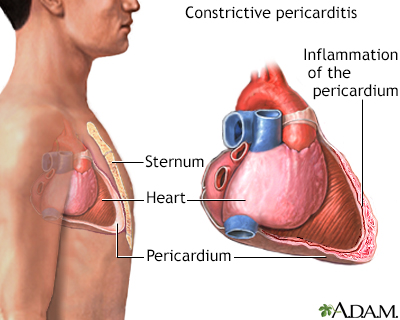Constrictive pericarditis

Constrictive pericarditis is a disorder caused by inflammation of the pericardium, the sac-like covering of the heart. Eventual thickening, scarring and contracture of the pericardium occurs causing it to be less elastic. This prevents the pericardium from stretching and results in reduced filling of the chambers of the heart. This reduces the amount of blood pumped by the heart and causes blood to back up behind the heart, resulting in symptoms of heart failure. Constrictive pericarditis may be life threatening if untreated.

|
Review Date:
5/8/2024 Reviewed By: Thomas S. Metkus, MD, Assistant Professor of Medicine and Surgery, Johns Hopkins University School of Medicine, Baltimore, MD. Also reviewed by David C. Dugdale, MD, Medical Director, Brenda Conaway, Editorial Director, and the A.D.A.M. Editorial team. |
The information provided herein should not be used during any medical emergency or for the diagnosis or treatment of any medical condition. A licensed medical professional should be consulted for diagnosis and treatment of any and all medical conditions. Links to other sites are provided for information only -- they do not constitute endorsements of those other sites. No warranty of any kind, either expressed or implied, is made as to the accuracy, reliability, timeliness, or correctness of any translations made by a third-party service of the information provided herein into any other language. © 1997-
A.D.A.M., a business unit of Ebix, Inc. Any duplication or distribution of the information contained herein is strictly prohibited.
